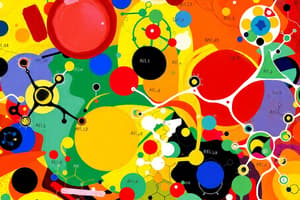Podcast
Questions and Answers
What is the process called when larger molecules are broken down into smaller units through a chemical reaction with the addition of a water molecule?
What is the process called when larger molecules are broken down into smaller units through a chemical reaction with the addition of a water molecule?
- Dehydration synthesis
- Oxidative phosphorylation
- Denaturation
- Hydrolysis (correct)
In what type of biological process does hydrolysis commonly occur?
In what type of biological process does hydrolysis commonly occur?
- DNA replication
- Cell respiration
- Photosynthesis
- Digestion (correct)
What type of bond is cleaved during a hydrolysis reaction?
What type of bond is cleaved during a hydrolysis reaction?
- Covalent bond (correct)
- Van der Waals bond
- Ionic bond
- Hydrogen bond
Which chemical process results in the cleavage of a covalent bond with the addition of a water molecule?
Which chemical process results in the cleavage of a covalent bond with the addition of a water molecule?
In which biological process does hydrolysis commonly occur?
In which biological process does hydrolysis commonly occur?
What is the result of a hydrolysis reaction?
What is the result of a hydrolysis reaction?
What is the primary function of starch in plants?
What is the primary function of starch in plants?
What type of bond links the simple sugars in polysaccharides?
What type of bond links the simple sugars in polysaccharides?
Which of the following best defines polysaccharides?
Which of the following best defines polysaccharides?
Flashcards
Hydrolysis
Hydrolysis
Breaking down larger molecules into smaller units by adding a water molecule.
Digestion
Digestion
A biological process where hydrolysis commonly occurs, breaking down food molecules.
Covalent bond
Covalent bond
The type of bond that is broken during a hydrolysis reaction.
Polysaccharides
Polysaccharides
Complex carbohydrates composed of multiple simple sugars (monosaccharides) linked together.
Signup and view all the flashcards
Glycosidic linkage
Glycosidic linkage
The type of bond that links the simple sugars in polysaccharides.
Signup and view all the flashcards
Energy storage (in plants)
Energy storage (in plants)
The main role of starch in plants, providing a reserve of energy.
Signup and view all the flashcardsStudy Notes
Hydrolysis
-
Hydrolysis is a chemical process that breaks down larger molecules into smaller units by adding a water molecule.
-
Hydrolysis commonly occurs in digestion, where large food molecules are broken down into smaller molecules that can be absorbed by the body.
-
During hydrolysis, a covalent bond is cleaved.
-
Hydrolysis results in the formation of two smaller molecules from a larger molecule.
Starch
-
Starch is the primary energy storage molecule in plants.
-
Polysaccharides are made up of simple sugars linked together by glycosidic bonds.
-
Polysaccharides are complex carbohydrates that are composed of many sugar molecules.
Studying That Suits You
Use AI to generate personalized quizzes and flashcards to suit your learning preferences.




